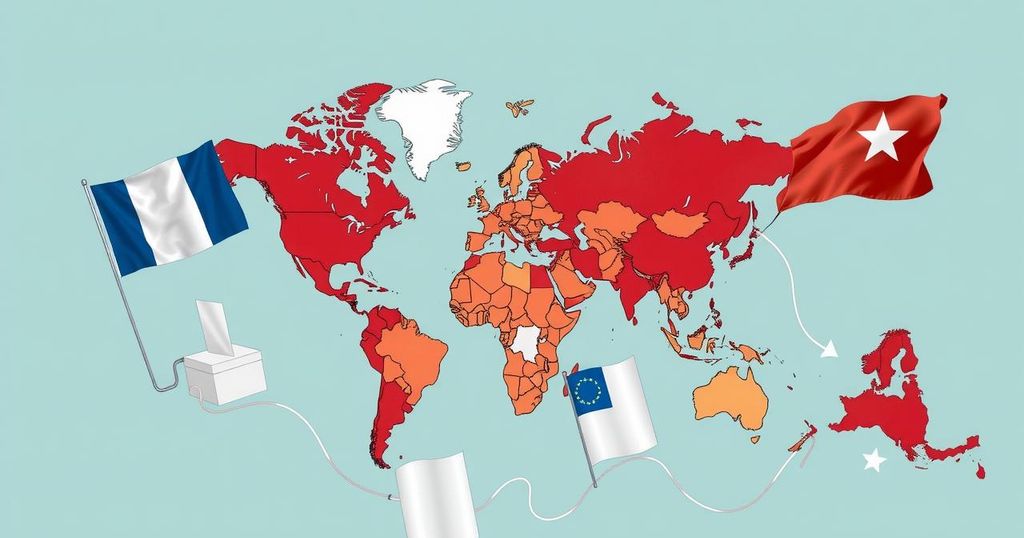2024 Elections: A Year of Voter Discontent and Political Turbulence Globally

In 2024, global elections prompted widespread voter backlash against incumbents in numerous countries due to economic hardships and dissatisfaction with governance. Significant political shifts occurred in countries such as India, South Africa, and the United States, reflecting a rising trend of populism and authoritarianism, compounded by concerns over foreign electoral interference. As political instability persists, the future of democratic governance appears uncertain.
The global elections of 2024 served as a stark reminder of citizens’ discontent, with voters in approximately 70 countries delivering a resounding message to incumbents: “You’re fired.” Economic turmoil and the aftershocks of the pandemic prompted significant backlash against ruling governments, witnessed not only in nations such as India and the United States, but extending to Japan, France, and Britain. This year has embedded a troubling narrative, marked by mass protests and escalating authoritarian tendencies in various regions.
The political atmosphere grew increasingly tumultuous throughout the year, characterized by abandoned elections and unrest in countries like Mozambique and Georgia. The University of Georgia’s Cas Mudde remarked on 2024’s political landscape, calling it “a great year for the far-right, a terrible year for incumbents, and a troublesome year for democracy around the world.” Many citizens expressed their frustration, which was attributed to what political scientist Rob Ford termed “electoral long COVID,” concerning the lingering effects of the pandemic and resulting socioeconomic challenges.
In South Africa, a significant shift occurred as the ANC, which had held power since the apartheid era, faced dramatic losses, indicative of a broader trend seen in Senegal, Ghana, and Botswana, where long-standing political parties were ousted. Notably, Prime Minister Narendra Modi’s Bharatiya Janata Party struggled in India, losing a parliamentary majority and necessitating coalition governance. In Japan, Prime Minister Shigeru Ishiba also faced significant election losses amid financial scandals, reducing his party’s control to a minority status. The UK also witnessed a political shift with Labour’s victory over the Conservatives after 14 years in office.
Concurrently, the year saw right-wing populism on the rise, particularly during parliamentary elections in the European Union. France’s National Rally party performed strongly but ultimately retreated due to tactical voting. Austria experienced the Freedom Party’s electoral victories, while dynastic politics remained prevalent in nations such as Pakistan and Indonesia, underscoring the continuing challenges to democratic ideals. Additionally, allegations of external interference, particularly from Russia, were reported in various elections, as demonstrated by events surrounding Romania’s presidential poll.
The 2024 U.S. election concluded with Donald Trump’s unexpected win, instigating reactions among global allies and adversaries alike. Meanwhile, political crises unfolded in nations such as Venezuela and Mozambique, revealing profound instability. As the year approaches a close, the tenuous state of several democracies raises questions about the prospects for stability and democratic governance in 2025, with surveys indicating a gap between people’s desire for democracy and their satisfaction with its current implementation globally.
In summary, the electoral landscape of 2024 showcased significant shifts in political paradigms across the globe. The rejection of incumbents, the rise of populism, and the ongoing challenges to democracy reflect growing discontent among constituents, encapsulated by their demanding better governance and accountability from their leaders.
The article examines the tumultuous political climate resulting from the global elections of 2024, emphasizing a widespread anti-incumbent sentiment. Voters across numerous nations reacted strongly against existing governments, motivated by socioeconomic disruptions stemming from the pandemic and geopolitical circumstances, such as inflation linked to the ongoing conflict in Ukraine. The article highlights significant electoral changes, rising populist sentiments, and external influences that culminated in a year described as chaotic for democracy worldwide.
The events of 2024 revealed a growing discontent with established political leaders across numerous countries, characterized by significant electoral shifts and protests against perceived governmental failures. The persistence of authoritarian trends, coupled with global interference in democratic processes, raises concerns about the future of democracy in various regions. As citizens grapple with their dissatisfaction, the implications for governance and political representation remain uncertain heading into 2025.
Original Source: www.news4jax.com







